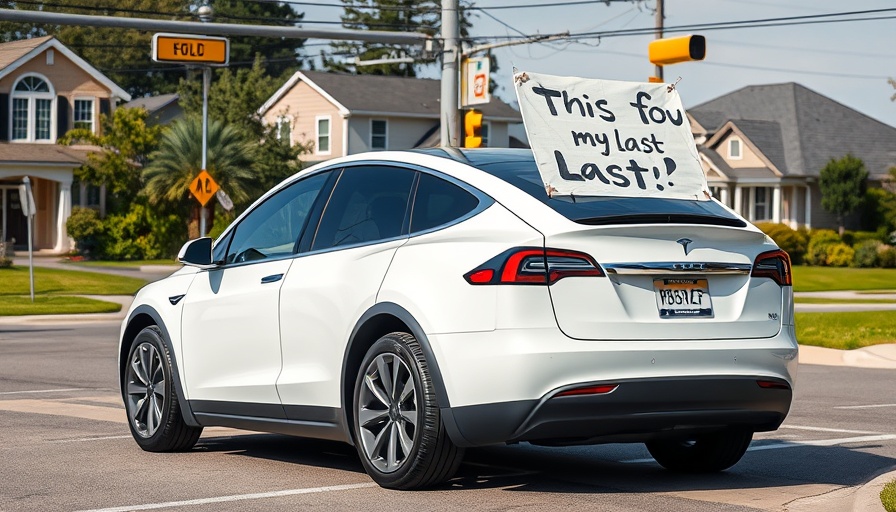
Elon Musk’s Dual Priorities: Company or Country?
As tensions around political engagement and corporate responsibility intensify, Elon Musk finds himself at a crossroads, dividing his attention between his duties at Tesla and his growing role in governmental affairs. Reports suggest that Tesla's board has initiated a search for a successor, raising questions about Musk's commitment to the electric vehicle giant amid declining sales and rising operational challenges.
The Fallout from Political Engagement
The criticism Musk faces is no small matter. His active political engagements have coincided with a significant dip in Tesla’s performance metrics. According to recent financial reports, Tesla has seen a staggering annual sales decline, marking the company's first downturn in over a decade, raising eyebrows among investors and analysts alike. With sales dropping from impressive highs, Musk’s political moves have sparked protests and negatively impacted Tesla’s brand image.
Implications of Succession Planning
The potential for a new leader raises both alarm and interest among stakeholders. While succession planning is a critical aspect of corporate governance, it often embodies uncertainty during transitional phases. Should Musk step down or significantly reduce his day-to-day involvement, how will that affect Tesla's trajectory, especially amidst competition from burgeoning electric vehicle manufacturers?
Looking Ahead: What Does Tesla’s Future Hold?
Musk's optimistic outlook during the latest earnings call offers a glimmer of hope. He assured investors that Tesla is “not on the ragged edge of death,” responding to fears of impending disaster. This assertion invites speculation on whether Tesla can rebound from its shaky quarter and restore significant market value. The question remains whether “allocation” of time can equate to tangible results in sales and customer loyalty.
Counterarguments: The Case for Commitment
While some may argue the necessity for a new direction at Tesla, it is crucial to weigh the value Musk brings as an innovative figurehead. His vision and capabilities have packaged Tesla as a leader in the electric vehicle market. Transitioning leadership could mean risking the brand’s identity and jeopardizing strategic directions that have been instrumental in its rise.
What Stakeholders are Saying
Investor sentiment sharply reflects the ambiguity surrounding Musk's leadership. Concerns voiced by board members hint at greater internal pressures to realign focus exclusively on Tesla. Additionally, analysts have noted that lack of clarity in succession planning can further compromise investor trust, complicating Tesla’s recovery efforts. How will the company mitigate dissent from both customers and investors in this transitional atmosphere?
The Broad Tech Industry Perspective
As these developments unfold, they suggest broader implications across the tech industry. Tech leaders often juggle multiple roles, a practice that may not align with the growing calls for focused leadership amid rapid innovation cycles. Observers are intrigued as to how Tesla’s challenges might influence other tech companies in balancing political and corporate priorities.
Final Thoughts: Why This Matters
Ultimately, Tesla’s saga is much more than a tale about a single company or an individual. It addresses larger narratives around the responsibilities of corporate leaders in modern society, public perception, and the influence of political engagement on business performance. Stakeholders from various backgrounds must continue to pay attention to these pressing dynamics, recognizing the interplay between technology, leadership, and a rapidly shifting socio-political landscape.
In an era where tech and politics are intertwined, understanding the implications of Musk’s role at Tesla and its succession planning is vital not only for investors but also for consumers committed to the future of sustainable transportation.
 Add Row
Add Row  Add
Add 



Write A Comment